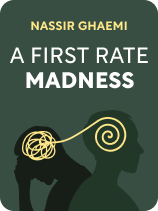

This article is an excerpt from the Shortform book guide to "A First Rate Madness" by Nassir Ghaemi. Shortform has the world's best summaries and analyses of books you should be reading.
Like this article? Sign up for a free trial here.
How can an untreated mental illness impact a leader’s role? What effect does proper treatment have on your work?
In A First-Rate Madness, Nassir Ghaemi argues that the manner in which you treat mental illness can affect leadership abilities. Proper treatment can enhance positive traits while improper treatment can impair crisis decision-making.
Learn how crucial mental health treatment is for leaders in important positions.
How Proper and Improper Mental Health Treatment Affects Leadership
According to Ghaemi, the treatment of mental health affects leadership—proper treatment can improve leadership while untreated mental illness can negatively impact leadership abilities. To explain how, Ghaemi takes us through the medical history of John F. Kennedy and Adolf Hitler.
(Shortform note: In his review of the effects of mental health treatment, Ghaemi focuses primarily on the drugs used to treat historical leaders in the early to mid-20th century. However, today, there are numerous methods for treating mental illnesses beyond medication, such as counseling sessions with a licensed psychologist, support groups, and creative or active therapies such as art or yoga. With a wide variety of treatments available, it has become easier to receive proper care to manage mental illnesses.)
According to Ghaemi, President John F. Kennedy and Adolf Hitler shared two notable similarities as leaders: Both had manic tendencies and both were treated with drugs that altered their mental states. While Kennedy successfully guided the US away from nuclear war thanks to his hyperthymic personality, Hitler set into motion a costly war that resulted in mass death and destruction.
For the first half of his presidency, doctors treated Kennedy with four kinds of steroids daily, which drastically altered his mood and impaired his ability to lead. However, by the early 1960s, they cut back on his steroid use, better managing the treatment of his mental illness. This proper treatment, Ghaemi argues, enhanced Kennedy’s positive manic traits (such as his high energy and resilience), contributing to his leadership successes during the second half of his presidency.
Specifically, these treatments allowed him to act appropriately when Soviet leader Nikita Khrushchev brought nuclear missiles to Cuba. Rather than limit himself solely to the black-and-white options of military action or inaction like Bush or Blair later would, Kennedy chose to establish a naval blockade that successfully led to Khrushchev withdrawing the missiles and avoided warfare.
In contrast, the improper treatment of Hitler’s bipolar disorder with amphetamines severely impaired his ability to lead. Before his abuse of drugs, Ghaemi argues, Hitler possessed many of the same positive leadership qualities associated with bipolar disorder such as the creativity of mania and the realistic judgment of depression. His abuse of amphetamines in 1937, however, exacerbated his illness, leading him to make extreme and aggressive military decisions that catapulted the world into World War II.
| Drug Abuse and Leadership in the 20th Century Ghaemi focuses on how drugs used to treat John F. Kennedy’s and Adolf Hitler’s mental illnesses affected their leadership. But experts note that it wasn’t only drugs for mental illness that affected leadership in the 20th century: Many political leaders of that era (not just those with mental illness) used or abused drugs that were prescribed for other ailments, and these similarly affected how they responded to crisis situations. Leaders often used drugs first because, since they were in positions of power, they had easy access to them, and second because people knew little about the negative effects of many drug treatments at the time. This made many leaders susceptible to another illness with harmful effects on their leadership abilities: addiction. Although Ghaemi doesn’t focus on Winston Churchill’s use of drugs, other experts point out that Churchill became so dependent on drugs and alcohol during his final year in office that he could no longer participate in decision-making. Similarly, Churchill’s successor, Anthony Eden, navigated the Suez Crisis disastrously, in the eyes of many, while addicted to amphetamines. According to experts, amphetamine abuse spread among elite groups around the mid-20th century as a result of “celebrity doctors” (doctors who became famous for treating celebrities). While, initially, amphetamines can increase alertness and energy, continued use can create a sense of grandiosity, loss of emotional regulation, increased impulsivity, and other impairments to leadership and decision-making abilities. Some historians believe that the German celebrity doctor Max Jacobson gave Kennedy regular amphetamine injections, although there aren’t any medical records that can confirm this theory. In Hitler’s case, experts believe that his doctor, Theodor Morell, gave the German dictator over 70 medications. From 1944 onward, Hitler took daily tablets containing caffeine and a form of amphetamine, along with cocaine. |

———End of Preview———
Like what you just read? Read the rest of the world's best book summary and analysis of Nassir Ghaemi's "A First Rate Madness" at Shortform.
Here's what you'll find in our full A First Rate Madness summary:
- How mental illness can make someone a better leader
- How leaders like Churchill and Roosevelt benefited from mental illness
- The pitfalls of being a mentally well leader during a time of crisis






